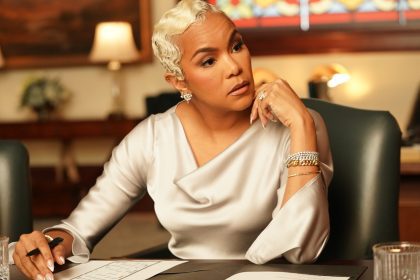In an era where public narratives are often hijacked by tabloid headlines and fleeting soundbites, Tashera Simmons is reclaiming her voice, one chapter at a time. Best known by many as the former wife of hip-hop legend DMX, Simmons has embarked on a transformative journey that transcends titles, headlines, and the shadows of her past. Her latest offering, a deeply personal and spiritually charged memoir titled Dying to Self, is more than a book, it’s a rebirth.
“I’ve been known as DMX’s wife for most of my life,” Simmons confesses. “But now, it feels good to start off with something that’s all mine.” That “something” is not just a story, it is a roadmap of survival, a testament to her spirituality, and a declaration of strength. With Dying to Self, Simmons has poured years of private pain and resilience into pages intended not to relive the past, but to liberate others from their own.
The memoir isn’t a tell-all. Instead, Simmons carefully curates stories that illustrate defining moments in her life, stories that are as raw as they are redemptive. “This process was like a sit-down therapy session,” she explains. “There was crying, frustration, and moments where I needed to step away. But each story was chosen to reflect a piece of me that transformed, healed, or grew.”
The emotional toll of that process cannot be overstated. Simmons bravely recounts memories of maternal abuse, betrayal and spiritual warfare. But she doesn’t stop at survival. She dives deeper, choosing faith over fear, and purpose over pain. “Me putting everything out in this book is me letting it go,” she says. “And my new chapter is not what’s in this book, it’s what comes after.”
‘Dying to Self’ talks about embracing celibacy to hear God
That next chapter is steeped in spirituality. One of the most poignant revelations Simmons shares is her 10-year journey of celibacy, a decision rooted in divine obedience and self-preservation. “I didn’t have vices like drugs or alcohol, but sex was my comfort. It became my vice,” she admits. “But the Holy Spirit told me I needed to remove it to hear God more clearly.” It wasn’t easy, but it was necessary. And in her vulnerability, Simmons exposes a truth rarely discussed: intimacy can be sacred, but it can also be spiritually burdensome when misaligned.
One of the most harrowing chapters revisits a chilling experience with a woman who, by all accounts, practiced voodoo. Simmons recalls feeling something deeply off about this particular woman, who had become entangled with DMX during a turbulent time in their marriage. “She was Cuban,” Simmons explains, “and there was an energy around her that didn’t feel natural, it felt dark, like she wasn’t just using words to influence him, but spirits.”
Simmons remembers entering a room where the woman had been staying and feeling an immediate shift in the atmosphere. “It was heavy. I felt dizzy, almost as if I was intruding in a space that didn’t belong to me spiritually. And then I saw the candles. The pictures. The things that no woman should see in her own home.” That moment marked a turning point, not just in her relationship with DMX, but in her spiritual discernment. “That’s when I knew I had to go deeper into prayer. I was not just fighting for my marriage, I was fighting something unseen.”
The pain of DMX’s affair with Aaliyah
Equally difficult was learning about the affair between DMX and the beloved late singer Aaliyah. “That one broke something in me,” Simmons confesses. “Not because of who she was, but because I had trusted him through so much already. And here was yet another betrayal, one I couldn’t have imagined.” Though she doesn’t dwell on it with bitterness, the pain was real. “It was a reminder that fame doesn’t protect you from heartbreak. It amplifies it. It plays out publicly while you’re still trying to make sense of it privately.”
Yet these stories, as painful as they are, serve a greater purpose in Simmons’s journey. They are not chapters of shame, they are stepping stones to sovereignty. “Writing about them helped me release them. And in doing so, I found my voice again.”
Through it all, faith is her anchor. Especially in the aftermath of DMX’s passing, Simmons recounts moments where she was “man down,” broken beyond recognition. “I needed my faith to get me back up,” she recalls. Her resilience is rooted in a relationship with God so deep that she describes it as “embedded in the heart.” It’s that same relationship that gave her the strength to not only survive, but to redefine her existence.
Still grateful for time with DMX
Of course, no conversation with Simmons would be complete without acknowledging the man whose name is forever linked to hers. And yet, her words are not tinged with bitterness, but with profound gratitude. “He introduced me to God. He taught me so many life lessons. No one can ever take away our history,” she says. “I feel blessed and highly favored that we were chosen to do life together, even for a time.”
In Dying to Self, Simmons invites readers into her most sacred spaces, not for pity, but for purpose. She wants her story to be a mirror for others facing their own silent battles. She wants her strength to be contagious.
This isn’t a comeback. This is a resurrection. And Tashera Simmons is finally walking in her own light.


















